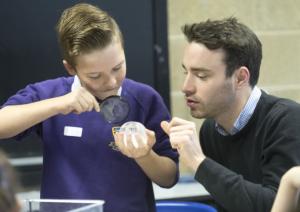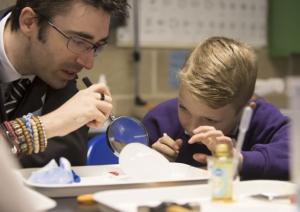People ask ‘why should men be primary school teachers?’ and we say ‘why not?” That’s the question posed by Martin Smith, primary education lecturer at UEA.
He points out that some children may not hear a male voice all day at primary school and in other schools there may only be one male.
“And he’s just as likely to be the caretaker or the headteacher as a classroom teacher,” says Martin.
He says primary school teaching is a brilliant career, and he should know. He took the PGCE teaching course at UEA and spent four years teaching at Blofield Primary and a further 14 at what was Horsford Middle, before taking his current job teaching the teachers.
“I loved it,” he says, adding that within his 18 years of teaching he couldn’t remember two days being the same: “Every day is different, just as every child is different,” he says. 
The UEA is keen to inspire more people into primary teaching, especially men.
“There is this perception still in society that if you are a teacher and male you must be a secondary school teacher and what we are trying to do is say why not teach in primary?
“Children get a different experience being taught by a man, it’s not better, but it is different,” says Martin.
Primary school and secondary school teachers earn the same, and Martin feels the primary age is endlessly rewarding.
“If you love the variety of teaching a range of different subjects and seeing children make those first formative steps in their learning, work in a primary school,” he says.
He points out that many people are involved with children of primary age – perhaps as sports coaches – and may make excellent primary school teachers.
“We want them to see it as a viable option, don’t ask ‘why’, ask ‘why not?’” he adds.
UEA welcomes trainee teachers from all backgrounds, and lecturers work hard to break down preconceptions about abilities to learn different subjects.
“We do see a lot of people who come out of school with a negative opinion of their own ability to do maths for instance and we spend a lot of time trying to change hearts and minds so they go into schools with a positive mindset that anyone can do maths, or art, or science,” he says.

